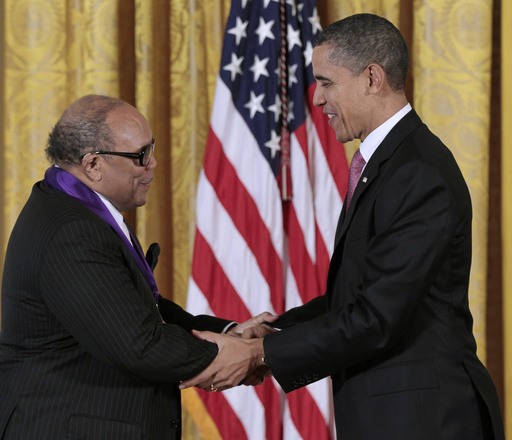
Quincy Jones, the legendary music producer known for a remarkable career that spanned decades, has passed away at the age of 91. His publicist, Arnold Robinson, confirmed that Jones died on Sunday evening in his Bel Air home, surrounded by family.
In a heartfelt statement, his family expressed their sense of loss while also celebrating the extraordinary life he lived. “With full but broken hearts, we must share the news of our father and brother Quincy Jones’ passing,” they said. “This heartbreaking loss leaves us mourning, but we shall always remember the greatness of his legacy.”
Jones’ journey began in the South Side of Chicago, and he overcame gang struggles to become an influential figure in entertainment. He was one of the first Black executives to pave a successful path in Hollywood, leaving behind a rich repertoire of music that encapsulates significant chapters in American history. For many music enthusiasts, it was almost impossible not to own a record associated with Jones over the past fifty years, and his connections ran deep in the fields of music, film, and television.
He mingled with an array of influential figures—from presidents to world leaders—and collaborated with iconic artists such as Frank Sinatra and Ella Fitzgerald. Throughout his career, he played numerous roles, including working with Count Basie and Lionel Hampton, creating memorable soundtracks for acclaimed works like “Roots” and “In the Heat of the Night,” and orchestrating President Clinton’s inaugural celebration. Additionally, he was a pivotal force behind the star-studded recording of “We Are the World.”
Jones’ distinguished career began in an era when music was primarily recorded on vinyl 78s, making it difficult to choose any particular achievement as his most significant. However, his work with Michael Jackson on albums like “Off the Wall,” “Thriller,” and “Bad” truly stands out. The partnership showcased Jones’ ability to harmonize with Jackson’s remarkable talent, which transitioned him from childhood fame to global superstardom. The duo embraced multiple genres such as disco, funk, rock, and R&B on tracks like “Billie Jean” and “Wanna Be Startin’ Somethin’.” For “Thriller,” Jones was instrumental in recruiting Eddie Van Halen for a guitar solo on “Beat It” and including Vincent Price’s chilling voice on the album’s title track.
The “Thriller” album broke records, selling over 20 million copies in 1983 alone, and marked a significant moment in pop culture, making Jackson the first major Black artist to have a music video featured on MTV. Jones once remarked, “Michael had the look and the voice, and I had every sound you can think of,” which encapsulated their fruitful collaboration.
The accolades accumulated throughout his career are extensive, filling 18 pages in his autobiography, “Q.” He received a remarkable 28 Grammy Awards from 80 nominations, an honorary Academy Award, and an Emmy for his work on “Roots.” Furthermore, he was honored with France’s Legion d’Honneur and the Rudolph Valentino Award from Italy. In 2001, Jones became a Kennedy Center Honoree for his lasting impact on American culture. He was also the focal point of a documentary titled “Listen Up: The Lives of Quincy Jones” in 1990, and his memoir achieved bestseller status.
In his book, Jones reflected: “Despite all the Grammys and the special awards and testimonials that maturity bestows, it will always be the values you carry within yourself — of work, love, and integrity — that carry the greatest worth.”
Quincy Jones was born in Chicago in 1933, where he grew up surrounded by music, citing his mother’s hymns as his earliest musical memory. He faced challenges during his upbringing; his mother struggled with mental health issues, leaving Jones to cope with a sense of senselessness in life. Much of his youth was spent navigating the streets of Chicago, caught up in gang activity, theft, and conflict.
Music ultimately became his refuge and saved him. After discovering a piano at a neighbor’s house, Jones found peace in music, knowing from that moment he wanted it to be his lifelong pursuit. In his teens, he began playing trumpet and formed a lasting friendship with famed musician Ray Charles. Despite receiving a scholarship to the Berklee College of Music, Jones chose to tour with Lionel Hampton instead, launching his dynamic career as a composer, conductor, arranger, and producer. He even supported Billie Holiday during her performances, and by the time he was in his mid-twenties, he had formed his own band.
Despite facing hardships, Jones recognized the distinction between “music” and “the music business,” stating, “We had the best jazz band on the planet, and yet we were literally starving.” Learning to navigate industry dynamics was crucial for his survival as an artist.
Jones is survived by his actress daughter Rashida Jones, as well as five other daughters—Jolie Jones Levine, Rachel Jones, Martina Jones, Kidada Jones, and Kenya Kinski-Jones—alongside his son Quincy Jones III and siblings Richard, Theresa, and Margie.
